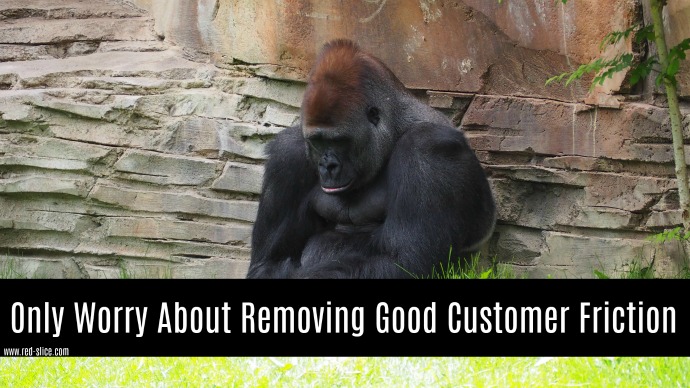 Your organization, business or work will induce friction. Accept that.
Your organization, business or work will induce friction. Accept that.
Friction is anything that makes a client or customer unhappy or prevents them from fully getting value from your work.
Some people will embrace what you have to offer. Others will reject it. But, inevitably, some humans who find barriers to consuming, accepting, buying, and supporting your work. They will hit bumps in the road rather than have a smooth, seamless, happy experience with your work.
The trick is to judge good friction versus bad friction so you know which is worth removing….and which is not. (Tweet This!)
Good friction–the kind you can improve upon, tweak, clarify or change to better serve people–looks like this:
- “It’s not clear from your website what you do or if this solves my problem”
- “The bottle pour spout is too big and makes too much come out all at once.
- “The instructions were confusing so I didn’t use the product.”
- “I thought you were delivering x, y or z but you never wrote anything down.”
- “The course did not deliver what you promised on the sales page”
- ‘Your website typos give me the impression you’re not professional.”
- “Your customer service rep never responded to my multiple emails.”
- “You were late to all our meetings.”
Bad friction–the kind that you can politely address but still stand your ground–looks like this:
- “I want my money back for the course because I didn’t have time to do the work.” (That’s on you, not us)
- “I’m not your target audience and would never buy your product but I’m offended by your social media posts.” (Sorry about that, but we’re serving our tribe, not you.)
- “Your work was useless. Of course, I never implemented your recommendations but, still, you didn’t do good work.” (Really? I delivered solid, expert advice. How do you know it’s not good unless you take action?)
- “Your work/art/book/song/brand/message sucks!” (Not everyone has to like what I do. Are you my target audience? If you give me something tangible to respond to perhaps I can improve it.)
Good friction is a valid criticism that can help you improve and bring you closer to a customer. It helps you improve, refine and clarify things to make it easier for people to love you. You can address this kind of friction and pave a smooth path to adoption and adoration.
Bad friction is just noise, excuses, and whining. If people are not willing to put in the time, implement your advice or thoughtfully judge your work, it is not friction you should worry about removing. Because that kind of friction is not real.




